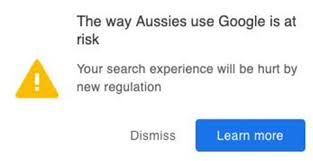Battle of the Giants Down Under
Both media companies used their platforms to rally an outcry against the potential rules, with Google embedding a Yellow Caution Sticker in its Australian home page and went further by telling content creators on YouTube (GOOG) to flood the ACCC with objections, while Facebook took a more direct approach, threatening to block Australians from sharing news items with friends and family if the bill was passed. Things continued to heat up until the Australian Prime Minister stepped in and warned Facebook and Google against using coercion to influence the proposed plan. The bill was tabled at the end of December and things began to quiet down, until last week when a third giant thundered into the fray, with Microsoft (MSFT) taking the side of the government and offering to fill the potential search gap that would be created if Google abandon its Australian customers in protest.
Microsoft President Brad Smith spoke to both the Prime Minister and Communications Minister and issued a statement assuring the government and population of Australia that news publishing is vital to the country and while Microsoft is not subject to the legislation, it would be willing to ‘live by the rules’ if the government were to designate Microsoft’, while helping small businesses and advertisers to transition to Bing instead of Google search. While Microsoft’s altruistic sounding intentions are a bit hollow when looking at search share in Australia, where Google has a 94.5% share and Microsoft has a 3.6% share, there is considerable evidence that the two social media giants have an advantage in terms of bargaining leverage, with $81 out of every $100 spent on online advertising going to the pair, Generating $4.3b for Google and $700m for Facebook in the country last year.
The bill would not directly influence the dollar amounts that either could generate in advertising revenue, but would create a framework for negotiations between local news and media companies and the two giants. If an agreement cannot be made the code assigns an arbiter to determine a fair payment level for the use of that news by Facebook and Google, and requires them to give advanced notice of any algorithm changes that might affect the new media business. If either social media company refuses to negotiate with local news sources, they face a penalty of $10m, or 10% of annual revenue, or 3x the benefit gained, whichever is greater. According to the Australian Prime Minister the bill is expected to pass into law ‘fairly soon’, with many countries watching to see how Facebook and Google react.

 RSS Feed
RSS Feed